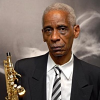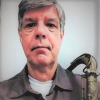Home » Jazz Musicians » Dewey Redman
Dewey Redman
Dewey Redman - tenor saxophone (1931 - 2006)
Texas-born jazz saxophonist Dewey Redman crossed the United States as a freelance musician during the early-to-mid 1960s before finding success within New York City's avant-garde jazz community. This success was founded by his membership in the Ornette Coleman Quartet, a group he was a part of from 1967-74. A child of the Depression era, Redman might have stayed the safe and secure course of his early career as an educator in his native Forth Worth, but he chose instead to seek his fortune in the jazz clubs of Manhattan. From Texas, Redman migrated westward to California where he honed his craft before moving to New York. Versatility and innovation are the trademarks of his experimental sound.
Walter Redman was born and grew up in Fort Worth. He started off on clarinet at 13, playing in a church band. Not long after, he met Ornette Coleman when they both played in the high school marching band. Their friendship would become one of the crucial links in his life.
Typical of late-1950’s jazz tenor saxophone players, Mr. Redman was informed by the sound and style of Dexter Gordon, John Coltrane and Sonny Rollins. But he didn’t immerse himself in technique and harmonic theory, as those musicians did, or lead a band until his mid-30’s. Until then, he said, he was largely playing by ear.
Consequently his playing always kept a rawness, a willingness to play outside tonality, a closeness to the blues and above all a powerful sound: an expressive, dark-toned, vocalized expression that he could apply in any situation. (This power could also come through his second instrument �" he played a double-reed instrument he called a musette.) He has often been called a free-jazz musician, and he could indeed put a logic and personality into music that had no chord changes. But that designation doesn’t acknowledge how authoritatively Redman could play a traditional ballad.”
After attending Prairie View A&M University in Texas, where he played alto and tenor saxophone in the college band, and then a stint in the Army, Mr. Redman taught fifth grade in Bastrop, Tex., near Austin. In 1959 he moved to Los Angeles and then San Francisco, playing with Pharoah Sanders, Donald Rafael Garrett and others.
Redman missed the ascension of his old friend Ornette Coleman, moving to New York to join the band only in 1967. His performances with Coleman over the next seven years, on albums like “New York Is Now!,” “Love Call” and “Science Fiction,” on which his tenor saxophone meshes with Coleman’s alto, are good ways to understand some of the great jazz of the period, intuitively finding a third way between general conceptions of the jazz tradition and the avant-garde.
Read moreTags
Ornette Coleman: New York Is Now & Love Call Revisited

by Stefano Merighi
Verso la fine degli anni Sessanta, il jazz deve combattere una battaglia impari contro il mondo del nuovo rock, sviluppatosi dopo l'anno del flower power e dell'influsso dei nuovi gruppi inglesi negli USA. Il pubblico è attratto dalle insorgenti fusioni stilistiche--che Miles Davis intercetta con genialità--ed evita con indifferenza il mainstream e ancor più la durezza dell'avanguardia legata al free jazz. Anche la figura cristallina di Ornette Coleman non se la passa troppo bene, tra difficoltà discografiche e ...
Continue ReadingOrnette Coleman: Ornette At 12, Crisis To Man On The Moon, Revisited

by John Eyles
The re-release albums on Ezz-thetics, by jazz legends from the 1940s, '50s and '60s, have been widely praised, particularly for their sound quality which is invariably much improved compared to the originals or later rereleases. Another impressive aspect of these re-releases is the behind-the-scenes detective work which has tracked down rarities by some iconic musicians. One notable example of this is the three previously unreleased live recordings by the Albert Ayler Quintet, from their autumn 1966 European tour, which appeared ...
Continue ReadingMomentum Space

by Dan McClenaghan
Momentum Space was released in 1999 on Verve Records. Considering the players--saxophonist Dewey Redman, pianist Cecil Taylor and drummer Elvin Jones--the album didn't make much of a splash. Reviews were mixed, leaning toward the dismissive. Taylor was 70 at the time. Jones was in his early 70s and saxman Redman was in his late 60s. Taylor was widely considered a genius of free jazz, or a madman who was going out there on the bandstand and jiving us--the ...
Continue ReadingDewey Redman B-Day, Mingus with electric guitars, Mary Halverson with strings and Kevin Eubanks with Orrin Evans

by David Brown
Charles Mingus with electric guitars, Mary Halvorson with strings and Kevin Eubanks with Orrin Evans. Birthday tributes to Dewey Redman and Fats Waller, plus new releases from David Murray and Ingrid Laubrock. Playlist Thelonious Monk “Epistrophy (Theme)" from Live at the It Club Complete (Columbia) 00:30 Fats Waller “Vipers Drag" from If You Got To Ask, You Ain't Got It!) (Bluebird) 01:30 Linda May Han Oh “Come Sunday" from Initial Here (Greenleaf Music) 03:52 David Sanford “Full Immersion" from A ...
Continue ReadingOrnette Coleman: New York Is Now & Love Call Revisited

by Mark Corroto
These sessions, the last two Ornette Coleman would record for Blue Note Records, in April and May of 1968, are generally remembered for the rhythm section. Was it Coleman or producer Francis Wolff that invited John Coltrane's former sidemen, bassist Jimmy Garrison and drummer Elvin Jones to record? Was this a scheme to draw the Coltrane listener into Coleman's domain? Likely no. Jones had left Trane's band when Rashied Ali was introduced into the band and the saxophonist shifted to ...
Continue ReadingDewey Redman, Bugpowder, Mario Pavone & Miles

by Maurice Hogue
Pianist Barney McCall was a member of the Dewey Redman Quartet several years ago and he happened to record one of their gigs in jny: Chicago. He didn't expect the audio quality would be much good so he forgot about it. Recently thought he gave it a listen, did some serious tweaking to the sound, et voila!—some never-heard-before Dewey. That's the feature this week. Sampled also are new releases from Buenos Aires drummer Andrés Elstein, the Dutch quartet Bugpowder digging ...
Continue ReadingDewey Redman: The Struggle Continues

by Budd Kopman
Dewey Redman, who died September 2, 2006 at the age of 75, will be best remembered for his work with Ornette Coleman from 1967-1974 and Keith Jarrett's “American" quartet in the mid-1970s, with an overall reputation leaning towards the freer side of jazz expression. The Struggle Continues, recorded in 1982, is making its first appearance on CD and is quite welcome. The overall style is on the straight-ahead side, but rather than merely play changes using the ...
Continue ReadingMusic Education Monday: A workshop with saxophonist Dewey Redman

Source:
St. Louis Jazz Notes by Dean Minderman
Today for Music Education Monday, you can take in a workshop with saxophonist Dewey Redman, the late Texas tenor man known for his big, bluesy tone, his associations with Ornette Coleman and Keith Jarrett, and these days, for being the father of saxophonist Joshua Redman. The elder Redman, who died in 2006, was born in 1931 in Fort Worth and went to high school with Ornette Coleman, forming a friendship that would last a lifetime. He played in Coleman's band ...
read more
Dewey Redman, 75, Jazz Saxophonist, Dies

Source:
All About Jazz
Dewey Redman, an expansive and poetic tenor saxophonist and bandleader who had been at the aesthetic frontiers of jazz since the 1960s, died on Saturday in Brooklyn. He was 75 and lived in Brooklyn. The cause was liver failure, said Velibor Pedevski, his brother-in-law. Walter Redman was born and grew up in Fort Worth. He started off on clarinet at 13, playing in a church band. Not long after, he met Ornette Coleman when they both played in the high ...
read more



























_with_Skip_Mcdonald_(Right)_23_n.jpg)










